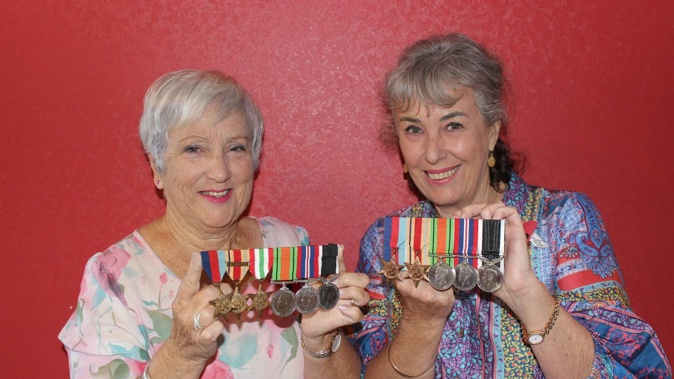
One day, while on one of their weekly group walks in Waikanae, Joanne Ruscoe and Suzanne Roberts discovered they had something extraordinary in common.
Not only were both of their fathers Allied prisoners of war in World War II, but they were both in the same German-run camp, Stalag 18A, in Austria.
The two also shared an interest in this period of their fathers’ lives, and each had a collection of medals, letters, photos and other mementoes.
Joanne’s father, Jim Dunn, and Suzanne’s father, Frank Tomlinson, were corporals in New Zealand Expeditionary Forces’ 21st and 25th Batallions respectively.
Jim, who was in his mid-20s when he went to war, and Frank, who was 21, both saw enlisting as an exciting chance to see the world.
At first, it was exactly that, and they travelled to many different countries, including England, Egypt, Greece and Italy.
Two years into the war, in 1941, Jim was captured at the Battle of Greece when he and 1855 others were outnumbered by German forces.
“They were totally overcome,” Joanne said.
Jim spent the rest of the war as a prisoner in the camp, and Joanne said life got so full of monotony for him that he had even forgotten his own birthdays and Christmas.
An old photograph of Jim Dunn next to his war medals.
He spent the next four years leading up to the end of the war working for the Germans, who were in desperate need of manual labourers with all their men at war.
Jim would spend his days building bridges, hauling coal and breaking up rocks, and Joanne said all that kept him going were letters from his family and food parcels from the Red Cross.
Frank was captured three years later in 1944.
During the Italian campaign at the Battle of Rimini, he was shot in the leg and left for dead before being found by German soldiers.
One soldier kicked him and he made a noise, which alerted the soldiers to the fact he was still alive, and they took him to the camp.
“He contracted gangrene, but luckily didn’t lose his leg,” Suzanne said.
Frank became close friends with cartoonist Neville Lodge, who was a schoolmate from their days at Rongotai College.
Neville, who later became a well-known Evening Post cartoonist, would draw cartoons depicting what their lives would be like back home, and Suzanne still has many of these drawings.
Frank Tomlinson (left) and Neville Lodge.
Frank, like Jim, also worked for the Germans leading up to the end of the war.
Suzanne recalls asking her father if he hated the Germans after what he went through, to which he replied, “No, they were just boys sent to war like us”.
Joanne and Suzanne often wonder whether their fathers ever met in Stalag 18A.
In 1945 the camp was liberated by the British Army, just a few months before the end of the war, and Jim and Frank were free again.
Looking back on their lives with their fathers, Joanne and Suzanne said neither man really spoke about their time in the war.
“Prisoners of war returning home didn’t really feel as though they’d done much,” Joanne said.
Both men loved the 1965 sitcom Hogan’s Heroes, and Joanne said her father’s love for the show always confused her.
“He roared with laughter watching it.
“Why, when he was a prisoner of war?”
Both men passed away quite young, Frank at 55 and Jim at 62, and Suzanne and Joanne thought the lasting impacts of the war could have been the cause.
Frank Tomlinson on guard duty, Egypt, 1942.
Joanne recently donated a number of mementoes from her father’s time in the war to the National War Museum, including original letters and papers and diaries, but not before taking copies.
“I hope it can be helpful to history students.”
She’s also written a book about her father’s life called Who was Jimmy Dunn?, which she has given copies of to her family.
She said she wanted to put her father’s life in context as much as she could.
“Keeping these documents safe and sharing the content with family so that the stories live on is important to Sue and to me.
“We encourage others who come across such information, particularly as older members of the family pass on, to keep the stories alive,” Joanne said.
“We can’t be the only ones with memorabilia from their fathers,” Suzanne added.
The two are volunteering and recruiting collectors for Waikane’s Poppy Day on April 21 and 22, which will be held outside New World and Countdown.
Suzanne Roberts (left) and Joanne Ruscoe are taking part in the Poppy Day appeal. Photo / David Haxton
“Money raised through the sale of poppies supports veterans and their families in our community,” said Joanne.
Take your Radio, Podcasts and Music with you

/cloudfront-ap-southeast-2.images.arcpublishing.com/nzme/VHIGH7BTJNGXTBAMTJSB5PQZ2M.JPG)
/cloudfront-ap-southeast-2.images.arcpublishing.com/nzme/J3LJFDCG2FHEFJUG6V4IEFMMK4.JPG)
/cloudfront-ap-southeast-2.images.arcpublishing.com/nzme/7K47W53YAFBDJHOKM3TM2TPKEA.JPG)
/cloudfront-ap-southeast-2.images.arcpublishing.com/nzme/WEBFP2SCWRFVNKHXTNIJHGT5VM.JPG)








